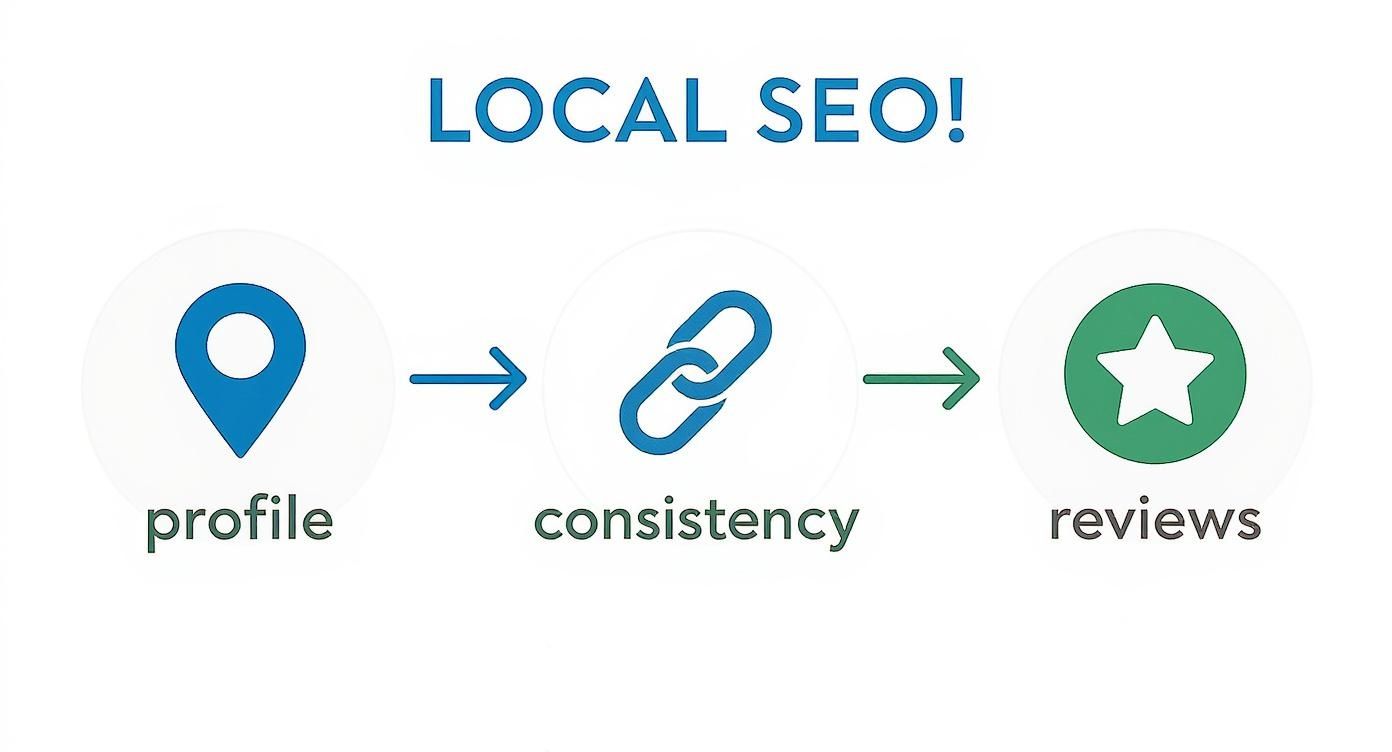SEO for doctors is about making sure your medical practice appears when local patients search on Google. It's how you become the go-to choice in your area. This makes your practice visible, trustworthy, and easy to find.
Why SEO Is No Longer Optional for Doctors
Patients don't find doctors the way they used to. Word-of-mouth referrals now almost always start with a Google search. Your online presence is just as important as your medical credentials.
Investing in SEO for doctors means meeting patients where they are—online. When someone types "best orthopedic surgeon near me" or "pediatrician accepting new patients," SEO decides if your practice shows up. If you're not there, you're invisible to potential patients actively looking for care.

Connecting With Today's Patient
Today's patients are empowered researchers. An estimated 77% of patients use search engines before booking an appointment. Over 80% use search to look up medical conditions.
The top three organic search results get about 75% of all clicks. If you're not at the top, you're missing out.
This shift in patient behavior makes search visibility essential. The traffic you get from organic search is valuable. These are high-intent individuals looking for exactly what you offer. Good SEO helps you capture their attention.
Building Trust Before the First Visit
A well-optimized website doesn't just attract visitors; it builds credibility. When your practice appears at the top of search results, it signals authority and trust. This digital first impression can be why a patient chooses you.
Think of your SEO work as part of a larger doctor marketing plan for sustainable growth. A solid SEO foundation provides benefits that grow over time:
- More Patients: Ranking for local keywords brings in qualified patients ready to book an appointment.
- A Stronger Reputation: Positive online reviews and helpful content establish you as a community leader.
- Sustainable Growth: Organic traffic provides a steady flow of potential patients without constant ad spend.
Finding the Keywords Your Patients Actually Use
Great SEO for doctors isn't about tricking the system. It's about understanding what your patients are thinking. People search for "doctor near me," but you need to dig deeper. Think about the exact words someone types when they're worried about a symptom or ready to book an appointment.
A patient isn't just looking for a doctor—they're looking for an answer. Someone with chronic back pain might search for "best treatment for sciatica pain" or "non-surgical options for a herniated disc."

That small change in phrasing is everything. It separates a casual browser from a potential patient who needs help. Your keyword strategy should focus on capturing these high-intent searches.
Decoding Patient Keyword Intent
Understanding patient intent is crucial. Not every search is the same. Some people are looking for general information. Others are ready to make a call.
This table breaks down how patients search. It helps you map the right keywords to the right pages on your site.
| Keyword Type | What the Patient Is Thinking | Example Search Query |
|---|---|---|
| Informational | "I have a symptom and I'm worried. What could it be?" | "what causes sharp stomach pain" |
| Investigational | "I have a diagnosis. What are my options?" | "endometriosis treatment options" |
| Transactional | "I know what I need. Who can help me right now?" | "cardiologist accepting new patients in Boston" |
Your goal is to target keywords from all three categories. Prioritize transactional keywords for your main service pages. Those are the searches that will fill your appointment book.
How to Find High-Intent Keywords
You don't need a huge budget to get started. Google itself provides helpful clues.
Here’s where to look:
-
"People Also Ask" Box: When you Google a condition, look at the "People Also Ask" section. These are real questions. A search for "knee replacement" might show "what is the recovery time for knee surgery?" Each question is a great idea for a blog post or FAQ.
-
Competitor Research: Look at the websites of other successful practices in your city. What services do they feature? What are they blogging about? Their website can give you ideas for keywords that work in your local market. To get more data, you can learn how to use Google's Keyword Planner.
-
Think Like a Patient: Brainstorm questions a patient might have before they meet you.
- What are their fears about a procedure?
- What insurance providers do they ask about?
- Are they looking for a female cardiologist or a pediatric specialist?
In Short: Don't forget keywords that include your practice and doctor names. When a patient gets a referral, they will Google you first.
Winning Over Local Patients with Smart SEO
For any medical practice, attracting local patients is key. This is where local SEO is important. It ensures your clinic is the first one people see when they need care now. When someone searches "pediatrician near me" on their phone, you need to appear in the top Google Maps results.
In Short: A well-managed Google Business Profile can drive over 70% of a practice's organic search traffic, making it your most critical local SEO tool.
Your Google Business Profile: The First Handshake
Your Google Business Profile (GBP) is your most valuable online asset. It's the info box in Google Search and Maps showing your address, hours, and reviews. A neglected profile doesn't inspire confidence.
Optimizing your GBP is a must.
- Claim and Verify: You need a profile for the practice and often one for each physician. A solo practitioner can use a single profile.
- Fill Out Everything: Complete every field. List all services, accepted insurance plans, and upload high-quality photos of your clinic and team.
- Use Correct Categories: Be specific. Your primary category should be precise, like "Orthopedic Surgeon." Add secondary categories like "Sports Medicine Clinic" or "Pain Management Physician."
🔑 Key Tip: Use the "Google Posts" feature regularly. Share clinic updates, health advice, or introduce a new team member. Every post signals to Google that your practice is active.
Building Trust with Consistent Info (NAP & Citations)
Your practice information exists on many sites like Yelp, WebMD, and Vitals. Google cross-references these sites for accuracy.
This is why NAP consistency is vital. Your Name, Address, and Phone number must match everywhere. A small difference like "St." versus "Street" can confuse search engines. These directory listings are called citations. Building them carefully helps establish your credibility. Learn more in our guide to local maps SEO.
How to Handle Patient Reviews Like a Pro
Reviews are a huge ranking signal for local search. They also provide social proof that convinces a patient to call you. Aim for a steady flow of new, positive feedback.
Here’s how to get more reviews:
- Just Ask: As a happy patient is checking out, encourage them to share their experience online.
- Send a Reminder: A polite, HIPAA-compliant email or text after their visit can work well. Include a direct link to your Google review page.
- Engage with Feedback: Thank patients for positive reviews. For negative ones, respond professionally, acknowledge their issue, and offer to resolve it offline, always protecting patient privacy.
Responding to all reviews shows you are an attentive provider. This builds trust before a patient even visits.
Creating Website Content That Builds Trust and Ranks
Your website is the digital front door to your practice. It needs to do more than list services. It must build trust, answer questions, and show Google you are an authority. This is where great SEO for doctors begins.
The best content is not about stuffing keywords. It's about creating genuinely useful resources that address patient concerns.
In Short: Write content for your patients first. When you answer their real-world questions clearly and simply, you naturally improve your SEO.
Write for Patients First, Google Second
The most effective content strategy is simple: answer the questions your patients ask every day. When you create clear and empathetic content, you naturally use the phrases people search for.
This aligns with Google's E-E-A-T guidelines—Experience, Expertise, Authoritativeness, and Trustworthiness. In the medical field, this is non-negotiable.
Here's how to do this on your site:
- Improve Service Pages: Don't just list a procedure. Dedicate a full page to it. Explain what it is, who it helps, the process, and answer common questions.
- Write Blog Posts in Plain English: Break down complex medical topics. Instead of "Myocardial Infarction Symptoms," try "Warning Signs of a Heart Attack You Shouldn't Ignore."
- Showcase Your Doctors: Your physician bio pages are huge trust signals. Detail their education, certifications, specialties, and consider adding a short video intro.
This infographic shows how local SEO elements work together. Strong content is a cornerstone of being seen.

A solid profile, consistent information, and good reviews are all supported by great content on your website.
The Essential On-Page SEO Elements
While writing for patients is the priority, a few technical items help Google understand your pages.
For every page you publish, focus on these three basics:
- Title Tag: This is the clickable headline in Google search results. Keep it clear, under 60 characters, and include your main keyword.
- Good example: "Pediatric Urgent Care in [Your City] | [Your Practice Name]"
- Meta Description: This is the text snippet under the title in search results. It doesn't directly affect ranking, but a good description (around 155 characters) encourages clicks.
- Headers (H1, H2, H3): Headers break up text and create an outline for readers and Google. Your page title should be an H1, with sub-topics under H2s and H3s.
Optimizing Your Site for Every Patient on Every Device
Imagine a worried parent searching for your clinic's phone number on their smartphone. If your website is slow or hard to use, they'll leave. They will call the next practice on the list instead.
In Short: Your website's performance on a phone is more important than how it looks on a desktop because Google uses mobile-first indexing to rank sites.
Google primarily judges your website based on its mobile version. A clunky mobile site can hurt your rankings, even if the desktop version is perfect.

You can use Google's free Mobile-Friendly Test tool to see how your site performs. A mobile-friendly site helps patients book appointments easily.
Making Your Site Fast and User-Friendly
For mobile users, two things matter most: speed and simplicity. Patients are often in a hurry. Your site must deliver what they need instantly.
About 63% of all Google searches now happen on mobile devices. If your site takes more than three seconds to load, over half of those potential patients are gone. You can find more healthcare SEO statistics on Practicebeat.com.
A faster site doesn't just please Google. It directly impacts your practice's bottom line.
A Quick Technical SEO Checklist for Your Practice
You don't need to be a coding expert to spot big issues. Here are a few things to check now.
- Boost Page Speed: Use Google's PageSpeed Insights tool. It's free and gives you clear suggestions, like compressing images.
- Simplify Navigation: On a phone, your menu should be simple. Can a patient find "Services," "Our Doctors," and "Contact Us" easily?
- Add Click-to-Call Buttons: Make it easy for mobile users to call you. A "Call Now" button at the top of the screen can increase appointment calls.
- Use Readable Fonts: No one wants to pinch and zoom to read your content. Use a font size of at least 16px for body text.
- Test Your Forms: Use your phone to fill out your contact forms. Are the fields easy to tap? Is the submit button large enough?
People Also Ask: Common Questions About Doctor SEO
Stepping into SEO can feel overwhelming when you're managing a busy practice. It's normal to have questions. You don't need to be a digital marketing expert, but understanding the basics is key.
How do I get my medical practice to show up on Google?
To get your practice on Google, focus on local SEO. Start by creating and fully optimizing your Google Business Profile (GBP). Fill out every section, including services, hours, and photos. Then, encourage patient reviews and ensure your practice's name, address, and phone number (NAP) are consistent across all online directories.
Why do doctors need SEO?
Doctors need SEO to connect with modern patients. Most people now search online to find healthcare providers, research conditions, and read reviews before booking an appointment. Without SEO, your practice is invisible to the large number of potential patients actively looking for the services you offer.
How long does it take for SEO to work for a medical practice?
You might see initial results from local SEO changes in the first 30 to 90 days. However, significant and lasting ranking improvements usually take 6 to 12 months of consistent effort. Think of SEO as a long-term investment in your practice's growth, not a quick fix.
Can I do my own SEO for my practice?
Yes, you can. While some practices hire an agency, there's a lot you can do yourself. Focus on high-impact tasks like:
- Managing your Google Business Profile.
- Writing helpful blog posts that answer patient questions.
- Ensuring your website is mobile-friendly using Google's free Mobile-Friendly Test.
Isn't paying for Google Ads the same as SEO?
No, they are very different.
- Google Ads (PPC): This is like renting. You pay for immediate placement at the top of search results. When you stop paying, your ads disappear.
- SEO: This is like buying. It’s a long-term investment in your website. It takes time, but you build a valuable asset that brings in free, organic traffic for years.
Many successful practices use a mix of both. However, SEO is what builds a sustainable engine for attracting new patients.
Ready to stop worrying about where your next patient will come from? Clicks Geek specializes in creating data-driven SEO and digital marketing strategies that fill your appointment book. Learn more about how we help medical practices grow.
Is Your Business Ranking in Google Maps?
Turn Google Maps into a Lead Engine w/ Clicks Geek’s AI-powered local SEO. 3,000+ clients served. Our proprietary, fully done-for-you Maps SEO system handles everything—keyword targeting, local optimization, content, reviews, and ranking strategy—automatically.






